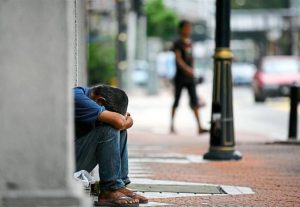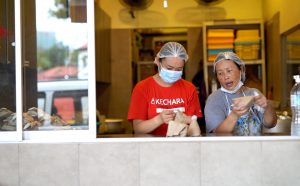Mahatma Ghandi once said, “A nation’s greatness is measured by how it treats its weakest members.”
How are we treating the weakest, the stranger, the children, the ill, the weak and the struggling?
The witness of volunteers serving the hungry throughout the week in the Klang Valley illustrates a call to see and not forget our homeless neighbors. Knowing and holding their stories, their sorrows is one part of our humanitarian audit.
The Transformation on the Street team sought out Kechara Soup Kitchen (KSK), one of a number of Klang Valley NGOs sharing the vision of feeding and supporting the homeless.
The global issue at a glance
 Technology is evolving at breakneck speeds. Governments are introducing more inclusive economic policies. And yet, homelessness continues to be a prevalent issue.
Technology is evolving at breakneck speeds. Governments are introducing more inclusive economic policies. And yet, homelessness continues to be a prevalent issue.
In fact, the last global survey conducted by the United Nations in 2005 revealed a staggering 100 million homeless people worldwide, amounting to 2 percent of the world’s population.
Back home in Malaysia, the Kuala Lumpur City Council (DBKL) has recorded an estimated 1,500 – 2,000 homeless people in the city of Kuala Lumpur as of 2016, showing a threefold increase from the year 2014 which recorded only 600.
Why is homelessness an issue in big cities?
Two main culprits are at play here:
Firstly, rising inflation which has led to arguably the most difficult time for Malaysians to own a home.
Secondly, (and perhaps more tragically) circumstances, which are outside of one’s control. For some, these include treatments for illnesses that have cost them their life savings.
In the end, these all point to one word – “unaffordability.”
In light of this, it is not surprising to see the slew of Non-Governmental Organisations (NGOs) forming worldwide to bring renewed hope for the world’s urban poor. And Kechara Soup Kitchen (KSK) is one such example.
Armed with an iron resolve of its founder His Eminence The 25th Tsem Rinpoche who believes that no one deserves to go hungry, KSK has been relentless in their pursuit of fighting homelessness. And 10 years down the road, the fruits of their labour continue to testify to this.
But what has been the key to their success?
Big on data
 KSK has managed to amass one of the largest databases of “clients” or urban poor individuals. Each of their clients has a pictured profile complete with their background and medical information.
KSK has managed to amass one of the largest databases of “clients” or urban poor individuals. Each of their clients has a pictured profile complete with their background and medical information.
This wealth of data helps KSK to better understand each clients’ needs which then translates into smoother running of overall operations. And in the name of transparency, all this data is accessible through a mobile app.
Prioritisation over mere people-pleasing
KSK has demonstrated a willingness to evolve with the needs around them. Wee Jit Yeong KSK’s current Operations Executive, describes an ongoing issue with the more “seasoned” homeless – an over familiarity with living on the streets and thus, an unwillingness to live life any differently.
Given KSK’s emphasis on resolving the root cause of homelessness, Wee shares that KSK has since gone through a prioritisation exercise, shifting their focus on some of their more time-consuming and costly programmes such as job matching and job preparation to the “newly homeless.”
An endgame of economic empowerment
 Beyond the homeless, KSK also supports the plight of certain financially struggling households – most notably, those of single mothers.
Beyond the homeless, KSK also supports the plight of certain financially struggling households – most notably, those of single mothers.
In addition to providing a monthly food distribution service to almost 400 marginalised households, KSK also provides training to single mothers, teaching them to sew items such as backpacks and rugs which are then sold back to KSK – all to help them make a simple income.
KSK’s emphasis on data and its willingness to evolve with the needs revealed in the said data, presents itself as a very well-oiled machine – a far cry from images one might naturally conjure up of a soup kitchen. Indeed, it stands as one of many examples of the value of having a soft heart for a good cause, but the hard feet to get the work done. The future is bright for KSK and the communities they serve.